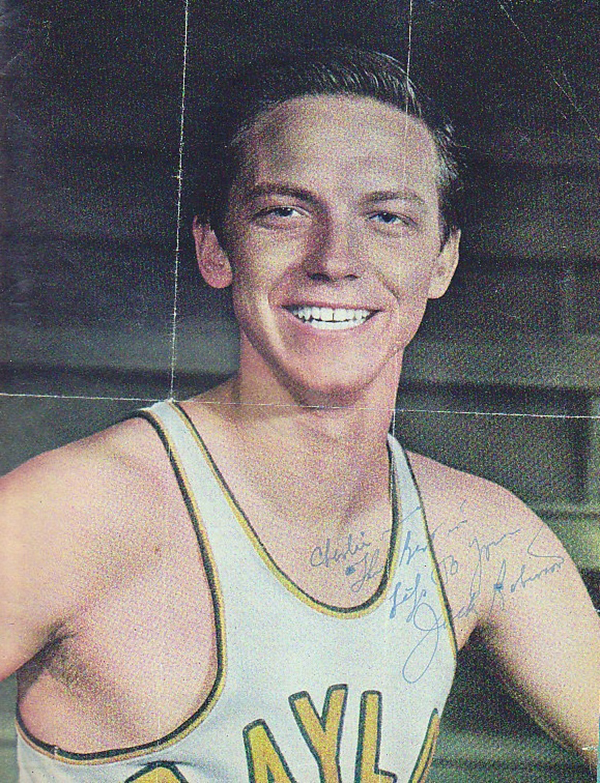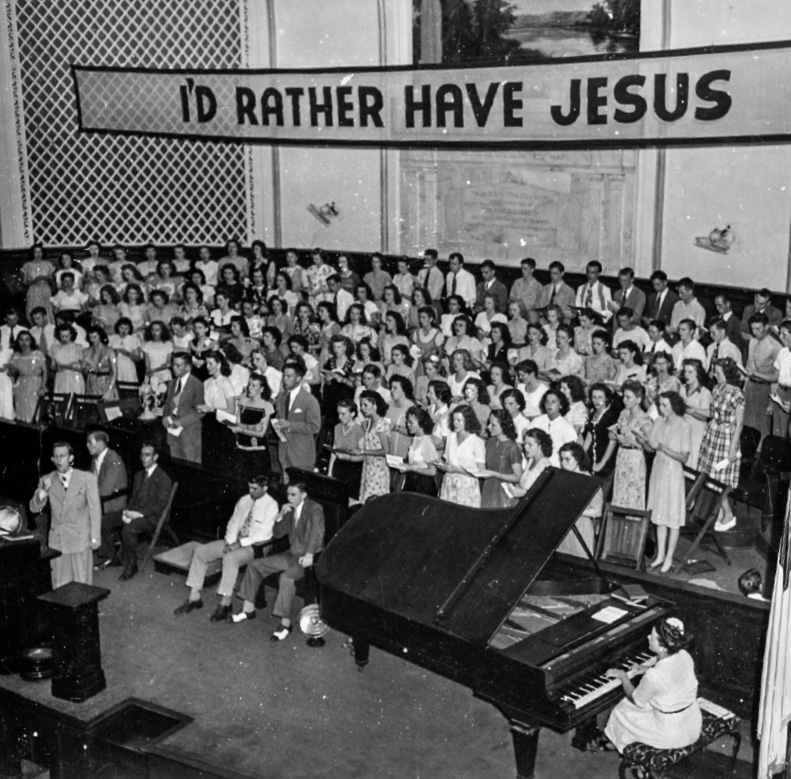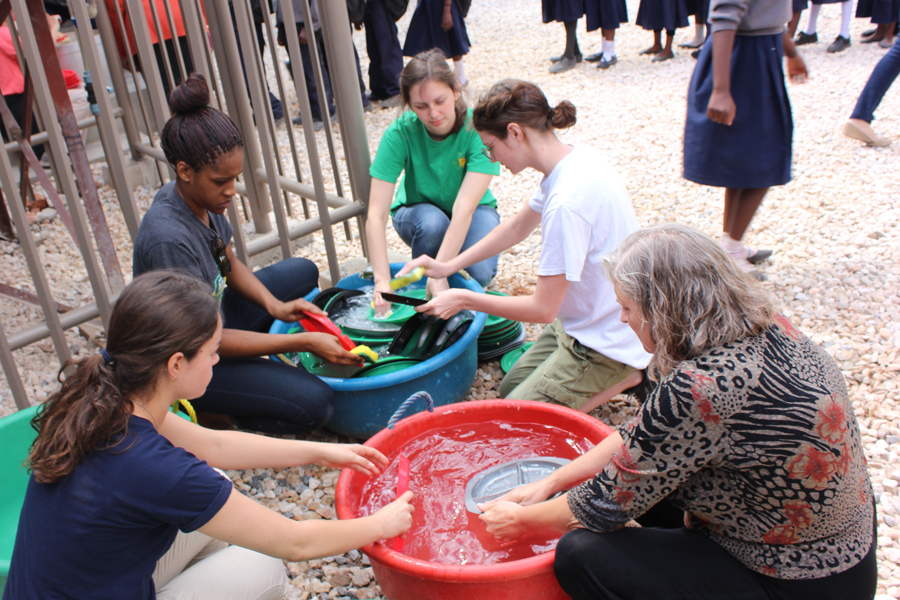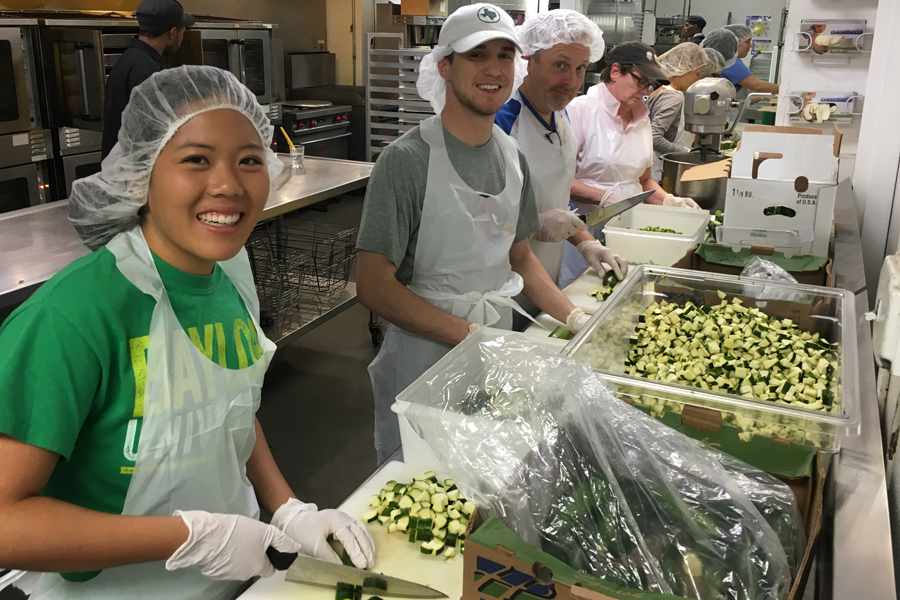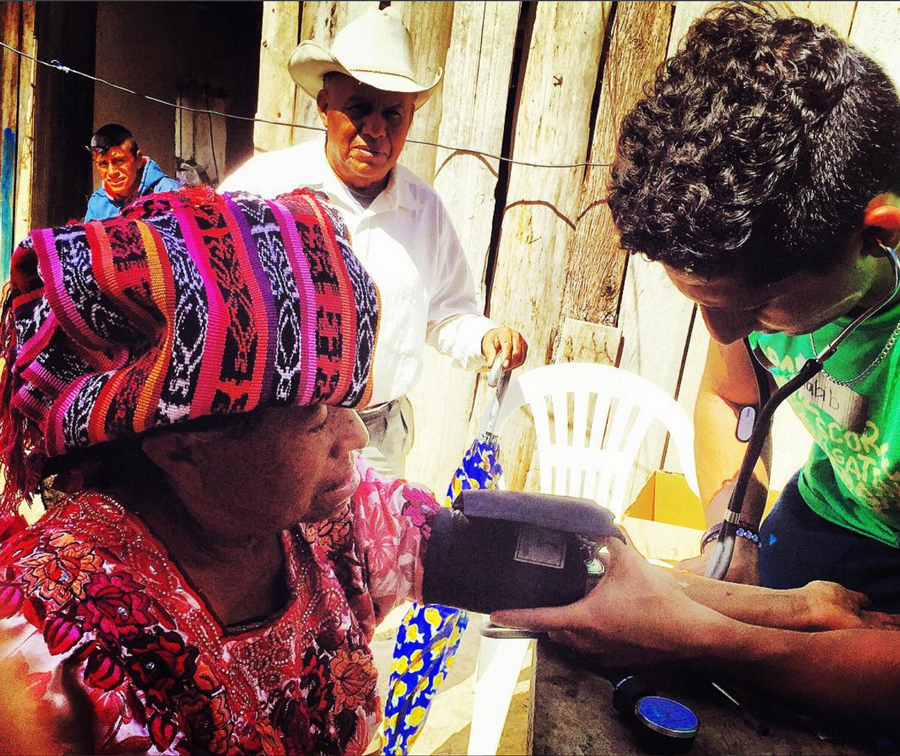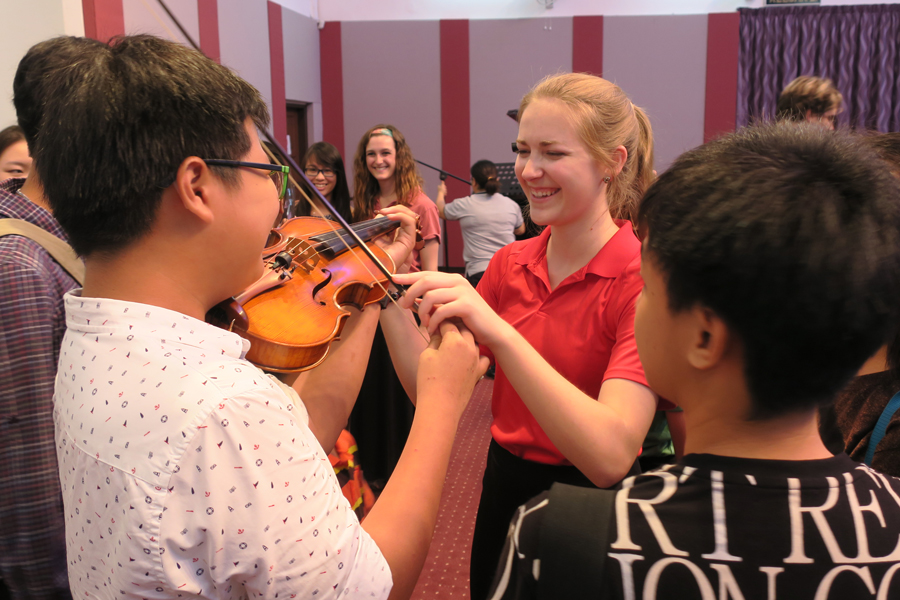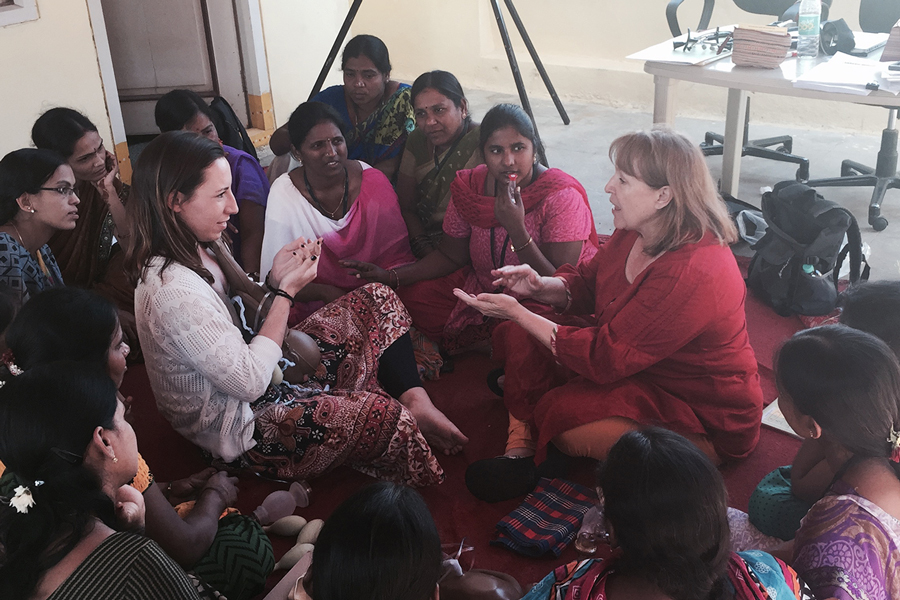75 Years of Baylor Missions
A celebration of saying 'yes' to a lifelong journey with God and neighbor
Baylor Athletics Hall of Fame member and former men’s basketball letterman Robert Lloyd Jackson “Jackie” Robinson, B.A. ’49, Ph.D., Th.D., remembers preaching at an outdoor revival service in Waco as a Baylor freshman in 1946.
“I was tongue-tied,” he says with a laugh.
Robinson began his time at Baylor that spring semester and helped the Bears to their first Southwestern Conference Championship since 1932 that season. He was Baylor Basketball’s third All-American and first two-time honoree (1946, 1948). Robinson was a member of Baylor’s 2006 All-Centennial Team, and he remains one of the most decorated players in program history.
“I knew I wanted to become a preacher, and that’s where I wanted to do it.”
Jackie Robinson, B.A. '49
That 1946 outdoor revival service was one of many times that Robinson’s prowess on the court landed him behind a pulpit as a college student. Fortunately for Robinson on that nerve-wracking evening, he was asked to share a message he already knew by heart: his personal faith journey. Robinson shared about how his father — a Baptist minister and fellow Baylor Basketball letterman — died when Jackie was 2. He spoke about growing up economically impoverished but rich in a legacy of faith. He told the crowd about discovering and developing a talent for basketball such that he received full scholarship offers to numerous colleges around the country, and how — as much as he loved the game — he’d always believed it was simply a means to a greater end.
“I always knew I was going to Baylor,” Robinson says. “I knew I wanted to become a preacher, and that’s where I wanted to do it.”
Robinson found his voice that night. Little did he know that seven months later his voice would put him on a plane headed for post-World War II Pearl Harbor as one of the key speakers on Baylor’s first mission trip — an event that set a precedent for generations of future students.
Youth Revival Movement
The aforementioned 1946 service was part of the early meetings of what became the Youth Revival Movement, a series of student-led, student-preached revivals in the 1940s that began at Baylor and was organized by the University’s Baptist Student Union (BSU). The events were held in high school auditoriums and gymnasiums, on college campus grounds, in church sanctuaries and under tents in parking lots. And they sometimes drew thousands of young people.
“It all began in prayer meetings on campus,” Robinson says. “There was a group of people at Baylor that had a fervent desire to win our generation for Christ.” The movement swept across the United States like wildfire embers carried on a strong wind, eventually landing in the U.S. Territory of Hawaii, which did not become a state until 1959. It was in Hawaii that a Baptist missionary couple heard of the remarkable spiritual renewal stemming out of Waco and beyond. They invited Baylor, with the support of BSU leadership, to send a small team to lead a week-long, citywide revival in Honolulu.
Again, students led the charge. Along with Robinson, some of the trip’s main speakers included Reiji “Ray” Hoshizaki, B.A. ’45, and Howard Butt Jr., B.A. ’47.
Hoshizaki was a California native who entered Baylor before the attack on Pearl Harbor and whose parents were interred in Japanese American World War II camps. He played a key role in kickstarting the Youth Revival Movement at Baylor. Butt, then a Baylor business major and heir apparent to his family’s grocery empire, shared his story with the conviction of one who, though he had enjoyed access to many physical comforts, had felt a deep emptiness until entering relationship with Christ.
The three men tirelessly offered their testimonies of hope throughout a city that was still reeling from the aftereffect of World War II.
“I think we spoke five times that Sunday alone,” Robinson says.
Their message and its timeliness struck a chord with Honolulu residents. Crowds steadily grew and more than 2,000 people attended the final service. Local missionaries were so impressed that they requested that a similar group return the following summer.
That invitation laid the foundation for what became the BSU Summer Missions program.
Baylor Summer Missions
Bruce McIver, B.A. ’46, was a key student leader in the Youth Revival Movement. He reported in his 2002 book — Riding the Wind of God: A Personal History of the Youth Revival Movement — that students in Texas raised more than $95,000 throughout the 1950s to send 152 students to worldwide missions fields, working hand in hand with career missionaries in more than 11 countries. Around this time, Baylor’s Baptist Student Ministries sought to understand how students could better serve communities in America. They began sending Baylor students on summer mission trips to serve alongside local churches, strengthening smaller congregations’ ministry and outreach capabilities. That sending has never stopped. As participation in annual mission trips became more and more a part of the University’s spiritual life culture, the Baylor community began to more closely explore the concept of missions. What did “going on mission” really mean? What was being “sent out” as the hands and feet of Christ really about?
A glimpse into student publications from that era — like this excerpt from the 1967 Roundup Yearbook, reveals a Baylor students’ exploration around the heart of missions:
“BSU SUMMER MISSIONS - Missions: the kind of person you are and your need to share. But there must be something imparted that is more than a message. No one ever lived more than Jesus Christ, and what he shared was not a creed but a life. Being a missionary is you sharing of yourself with another and his sharing of himself with you. And when this is done, it is mission.”
“The sharing of yourself with another.” That could look like a spoken testimony, but it was also much more.
Baylor Assistant Dean for Missions and Public Life Becky Kennedy, M.B.A. ’14, reflects on questions around the concept of missions and its application in the world today. The word “missions” comes from the Latin term missio Dei or the “mission of God.”
“It’s an invitation to follow Christ, to journey with Him in relationship for the rest of your life,” Kennedy says.
Not a Creed, But a Life
For Baylor students who began their experiences of preaching and sharing their testimonies during the Youth Revival Movement of the 1940s, it was not a singular, impassioned-but-fleeting moment in time. It was not a college-aged zeal that would fade with the years. It was a lifelong commitment to their own missio Dei.
Many of the Youth Revival Movement leaders became some of the most influential Baptist pastors and Christian leaders of their time in Texas and beyond. They accepted the invitation of being on mission with God and followed with their whole lives, whether pastoring a church flock or running a mammoth-sized business.
Robinson could have played in the blossoming National Basketball Association after college. Instead, he became a minister, first shepherding a church in Europe and then serving as pastor of First Baptist Church of Augusta, Georgia, from 1953 to 1974.
Hoshizaki, who died in 2010, became the first missionary sent by the Baptist Missions Board to serve in Japan after the World War II. Later, two of his and his wife Alice’s children became missionaries to Japan, carrying on a multi-generational legacy. Butt’s path to ministry was as a layperson. He took the helm of running daily operations for his family’s business — the H-E-B Grocery Company — and later served as president of the Butt Family Foundation. Throughout his 60-year career, Butt never lost his sense of calling that was ignited at Baylor, traveling and preaching most weekends and serving as an associate evangelist with the Billy Graham Evangelistic Association. Butt died in 2016.
Running Laity Lodge, an ecumenical Christian retreat center where laypersons and clergy alike could come rest in God’s presence and be renewed, was always an effort dear to Butt’s heart. Throughout his adult life, Butt said he felt called to the ministry of preaching and to serve God in the grocery business, as well.
Vocation as Calling
In 2002, the Baylor Department of Missions was established out of a desire to help Baylor students make the connection between vocation and calling for a missional life beyond college. The department’s goal was to equip students to love God and love their neighbors by using their specific skills, talents and areas of study to serve others, and to lead out in creating opportunities for students to be transformed by the integration of faith, learning and service in diverse cultures and communities around the world.
Baylor Missions provides Baylor students with more than 40 discipline-specific mission trip opportunities to serve in 20+ different locations.
Three years after the department launched, Baylor had its first discipline-specific mission trip to Kenya. Excluding the last two summers due to the COVID-19 pandemic, Baylor students now have as many as 40 mission trips in 20-plus global locations from which to choose.
“As an institution, we want to be part of this mission with God and be the hands and feet of Christ,” Kennedy says. “We also want to launch our students into this lifelong, vocational journey.”
It is the belief that any discipline can be used to share the gospel and respond to Christ’s call in Matthew 25 (feed the hungry, clothe the naked) in its own way and out of its own strengths. Sometimes, it is Baylor nursing students caring for refugees along the U.S.-Mexico border in the Rio Grande Valley. Sometimes, it is engineering majors installing solar-based energy equipment so Haitian families experiencing poverty can launch and run their own businesses or children can go to school.
Kennedy maintains that students and faculty on Baylor mission trips have an intention to learn from the communities and the people they seek to serve. That posture of humility — of first being a learner and then being a helper — is key to what makes these experiences powerful for all involved.
“When I travel to your home and eat at your table, I learn to appreciate your culture and value your way of life. A relationship is formed, and that’s what changes each of us,” Kennedy says. “I have seen hundreds of Baylor students have these transformative experiences and come out better humans and neighbors, more Christ-centered and people-focused than they were before they left. Sometimes, the only way you can truly experience something is to be physically present.”
The COVID-19 pandemic brought new challenges for Baylor Missions as borders closed and travel became an impossibility. Collaboration and innovation were necessary.
Virtual Missions
Last fall, Baylor Missions collaborated with faculty partners in different disciplines to engage their classes in experiential virtual mission projects. The students connected with local and global community partners via web conferencing technology to identify needs and implement action plans.
Addi Smith Dunayer, B.B.A. ’21, was part of a team of entrepreneurship students tasked with designing an artisan market and a sustainable business model and marketing plan for villagers served by Baylor global partner One More Child in a remote area of the Dominican Republic. Dunayer says it was inspiring to see what could be accomplished on behalf of a village nearly 2,000 miles away.
“Something I’ve definitely struggled with is how to pursue God’s mission whenever I’m not in the trenches of the quote-unquote mission field, but I’m going into corporate America,” Dunayer says. “This project definitely opened my eyes to the fact that my God-given strengths and the major I chose can directly benefit the Kingdom of God in ways that I didn’t realize when I was entering college.”
Dunayer, who majored in accounting and finance, begins a commercial banking job in Dallas this summer.
“It’s also made me realize that whatever my career looks like, if I do everything I can with excellence unto the Lord, it will make an impact on the people around me,” she says.
Baylor students planned and designed the market, and Baylor Missions will fund the market’s physical construction. Albeit through computer screen, seeing the looks on the One More Child representatives’ faces to this news was Dunayer’s favorite moment in the semester-long project.
Kennedy anticipates the day when Baylor will be able to again send students on mission trips around the globe.
“There will always be something uniquely transformative about international travel and what it does for a student to be immersed in every way,” Kennedy says. “But we also have to make these opportunities accessible, and technology has helped us do that.”
Baylor Missions in the New Normal
The world has changed in many ways since the start of missions at Baylor in 1946. Technology has developed, the church has evolved, and Baylor’s approach to missions changed, as well. However, the message remains the same: Everyone is invited into the missio Dei, into the mission of God.
“We can’t create the transformation, but we can create the space for transformation.”
Becky Kennedy, M.B.A. ’14, Baylor Assistant Dean for Missions and Public Life
Whether it is from a student’s local church or the enduring investments of endowment, student mission experiences have always relied upon the philanthropy of others from within the Baylor Family. Recently, Mark, B.B.A. ’80, and Jenni, B.S.Ed. ’80, McCollum of Houston designated $7.9 million in their estate plans for the McCollum Missions Fund. Contributions such as this ensure that Baylor is able to continue creating spaces for outreach and transformation.
“We are so grateful for people like Mark and Jenni who see the opportunity to support missions at Baylor as part of their own journey with God,” Kennedy says. “Their investment will shape the lives of future generations of Baylor students, equipping them to take on and solve systemic issues, to be the hands and feet of Christ to our world during their time at Baylor and throughout their lives beyond.”
Baylor’s drive to help students discover their callings through creating opportunities for them to use their skills and talents to serve others around the world will also not change.
“We can’t create the transformation," Kennedy says, "But, we can create the space for transformation.”
